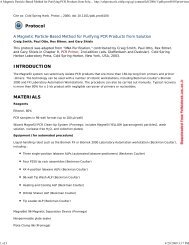uilding a business© 2010 Nature America, Inc. All rights reserved.redemption of the securities purchased by theinvestor and registration rights.The type of security (Box 3) that the investorwill purchase is directly related to its exit strategy.For example, investors may use a promissorynote to try to protect their investment inthe event that the company is sold or dissolvedby having a ‘liquidation preference’ (liquidationincludes being sold). Essentially, the liquidationpreference says that if the companyis sold or dissolved for whatever reason, theinvestor’s investment (or a multiple thereof)is paid back in full before any funds are paidto other stockholders.This should be of special concern to youbecause it represents an amount of money thatwill be paid out before you, as founder, get onedime of the proceeds. You should try to negotiatethe most narrow liquidation preferencepossible to maximize the amount of money thatwill go to you and other stockholders. Tensionsmay arise only upon liquidation because theliquidation preference can often reveal divergingviews between an investor, who might havelittle incentive to seek additional revenue for thefounders at exit, and the founders, who wouldlike to finally share in a payday after years ofunderappreciated efforts.In the case of a strictly failed biotechcompany (not taken public or acquired, forexample), the investors will typically take anyavailable cash to recover their lost investmentwhen assets are sold off to the highest bidder.The most valuable assets are often the patentrights and in-licensed rights, and they can beaccompanied by trade secret information,such as clinical data from patient trials oreven a Food and Drug Administration drugapproval, as well as real estate, furniture andthe like. Here you could often receive little ornothing due to the liquidation preference, butit may be possible to negotiate around the liquidationpreference and obtain a share of anycash proceeds raised by asset liquidation.Preferred stock that is ‘redeemable’ meansthat the stock must be repurchased by the companyupon the happening of a specified event,such as the passage of time, an insufficient levelof cash, a failed drug trial, poor clinical studyresults, criminal accusations over patient consentor merely at the option of the investor. Thecompany will normally have to purchase thestock back at the investor’s purchase price plusany accrued but unpaid dividends. Redemptionis a feature of preferred stock that is generallydemanded by investors in the current market.Registration rights provide an investor withthe power to register the shares of stock he orBox 3 Defining stockAll types of stock are not equal. The main types of stock that you will encounter fall intothree categories:Common stock. This is the normal type of stock that all companies issue, and the rightsof common stockholders are set forth in the corporation laws of the company’s state offormation. Common stock is usually owned by the founders.Preferred stock. This is usually demanded by most professional investors. Preferred stockis created by amending the company’s certificate of incorporation to include the typeand amount of preferred stock issuable and the rights and privileges of the preferredstockholders. Preferred stock normally has preference over common stock when issuingdividends and distributing assets upon the liquidation or sale of the company. The termsof the preferred stock are typically heavily negotiated and should be discussed in detail inthe term sheet to ensure the parties agree on this fundamental point.Promissory note. This can take the place of stock and is usually convertible to common orpreferred stock upon the occurrence of a certain event (for example, meeting one or morecommercial milestones like successful phase 1, 2 or 3 trials), the passage of time or atthe option of the investor. The terms of the promissory note are also heavily negotiated andshould be addressed in the term sheet. The investor may prefer a promissory note becausein the event of liquidation, noteholders typically recover their investment before anystockholders, even preferred stockholders. Convertible promissory note deals are commonin very early stage investing or in so-called ‘bridge’ financings (short-term loans made inanticipation of subsequent equity financings).she owns during the company’s initial publicoffering (IPO) or after the company hascompleted its IPO. Registered stock is freelytransferable. Even so, it should be noted thatalthough agreements regarding registrationrights are enforceable, the underwriter mayrestrict or eliminate such rights at the timeof an IPO depending on both the respectiveregistration rights of other investors and themarket conditions.ConclusionsRegardless of whether your transaction involvesan investment, an asset purchase, a joint developmentproject or a more complex structure, itis crucial for the parties to enter a term sheet—itwill substantially increase the chances of successfullyclosing a deal. Also, having a written agreementthat outlines the terms of the transactionwill minimize the potential for confusion, costlynegotiation and disagreement between the partiesduring the drafting and negotiation of theinvestment documents.Depending on your need for capital andthe relative attractiveness of your companyto investors, the terms of a financing transactionmay or may not be negotiable. If you donot immediately need funds and the investorfinds your firm attractive, you will have moreleverage negotiating financing terms than ifyou face an immediate cash crisis. Either way,you should pay particular attention to a fewkey terms of the investment. Specifically, tryto negotiate advantageous positions regardingthe percentage of equity the investor will purchasein the transaction, the amount of controlthe investor will have over the company’sdaily operations and major decisions and theamount of money the investor will receiveupon the sale or liquidation of the company.These terms will directly affect the control youand the other founders have over the companypost-investment, as well as your share of theinvestment returns.Money can be hard to find right now,but according to a survey conducted by theUS National Venture Capital Association(Washington, DC) in December 2008,(National Venture Capital Association, 2009Venture Capital Predictions Survey Results,Dec. 17, 2008), the biotech and life sciencesectors are viewed as the second most promisingareas for increasing venture investment.If that’s correct, close scrutiny of term sheetsin biotech ventures is going to become evenmore important than before.To discuss the contents of this article, join the Bioentrepreneur forum on Nature Network:http://network.nature.com/groups/bioentrepreneur/forum/topics122 volume 28 number 2 FEBRUARY 2010 nature biotechnology
correspondenceFab-arm exchange© 2010 Nature America, Inc. All rights reserved.To the Editor:In a recent Letter, Labrijn et al. 1 reportedthat therapeutic wild-type IgG4s engagein Fab-arm exchange with endogenoushuman IgG4 in vivo. The work presentedembellishes a theme that was revived by vander Neut Kolfschoten et al. 2 , who confirmedin an excellent paper previous hypothesesand findings 3,4 , that is, that IgG4s aredynamic molecules that exchange Fab armsby swapping a heavy chain and attachedlight chain (half molecule) with a heavylightchain pair from another molecule,resulting in bispecific antibodies. Whereasvan der Neut Kolfschotenet al. 2 suggest that futurestudies should addressthe contribution of IgG4Fab-arm exchange to invivo activity of therapeuticmonoclonal IgG4 antibodies,Labrijn et al. 1 demonstratethat Fab-arm exchangebetween natalizumab(Tysabri) and endogenoushuman IgG4 can indeed beobserved in blood samplesfrom natalizumab-treatedindividuals. It is unfortunatethat Labrijn et al. 1 do not address theintriguing suggestion raised by van der NeutKolfschoten et al. 2 , and no data are presentedon how the phenomenon of Fab-armexchange may affect the therapeutic activityof therapeutic wild-type IgG4. Instead,Labrijn et al. 1 repeat what was alreadypostulated by van der Neut Kolfschoten etal. 2 ; that is, that Fab-arm exchange could havebiological consequences in that the bindingto the cognate antigen could change in timefrom an avidity to an affinity interaction,thereby possibly decreasing binding strengthand changing homologous cross-linkingto non-cross-linking behavior. Indeed, thisis a significant take-home message and itcontributes to the overall knowledge of animportant subclass of therapeutic antibodies.The awareness of Fab-arm exchange andthe subsequent undesired introduction ofunpredictability for human immunotherapy,as created by van der Neut Kolfschoten etal. 2 and confirmed by Labrijn et al. 1 , is ofsubstantial value for antibody developmentcompanies who choose IgG4 as the preferredsubclass for their products. We thereforeagree with the conclusion that mutations thatprevent Fab-arm exchange in vivo should beconsidered when designing therapeutic IgG4.In a Perspectives article that accompaniedthe original Fab-arm exchange paper by vander Neut Kolfschoten et al. 2 in Science, Burtonand Wilson 5 rightly drew attention to thesignificance of the work. They concluded bystating, “[In instances where wildtype IgG4molecules have been used inclinical trials] the possibilitythat Fab arm exchange couldcontribute to adverse effectsin IgG4 therapy [6,7] shouldbe explored immediately,”thereby referring to paperspresenting the cytokinestorm precipitatedby TGN1412 (ref. 6)or the occurrence ofprogressive multifocalleukoencephalopathy (PML)in natalizumab-treatedpatients 7 . This concludingstatement introduced an alleged link betweenwild-type IgG4 and adverse events.Labrijn et al. 1 refer to exactly this statementin the last part of their letter where they recitethat the potential exchange with preexistingIgG4 with undesired specificity raises thepossibility that Fab-arm exchange couldhave contributed to some of the adverseevents reported for wild-type IgG4. It isregrettable that, in contrast to Burton andWilson’s 5 suggestion, Labrijn et al. 1 do notfurther explore the possibility that Fabarmexchange could have contributed toeither the occurrences of PML or cytokinestorm experimentally. Instead, Labrijn etal. 1 briefly summarize the current theoryof reduced immune surveillance, whichplausibly explains the occurrence of PMLin natalizumab-treated patients, but goon to counter that JC virus (JCV)–verylate activation antigen 4 (VLA4; or alpha4beta1 chain integrin) bispecific antibodiesmediate transport of JCV into the centralnervous system (CNS) to cause PML. Notonly have they failed to provide supportingexperimental data but they offer nosubstantiating evidence from the literature.The mechanism by which JCV-VLA4bispecifics might mediate transfer of virusto the CNS is presumably based on thefollowing assumptions. First, sufficientamounts of anti-JCV IgG4 should bepresent in the circulation to form JCV-VLA4bispecifics. Labrijn et al. 1 do not reportdata on potential detection of JCV-VLA4bispecific antibodies in natalizumab-treatedpatients, nor do they predict what the chancesof formation of these would be. In a recentstudy, Egli et al. 8 measured the prevalence ofJCV infection and replication in 400 healthydonors. They report the IgG seroprevalencefor JCV to be 58%. However, it is not furtherspecified what proportion of the JCV IgG wasIgG4. But assuming that IgG4 anti-JCV willbe present in a proportion of healthy donors,JCV-VLA4 bispecifics are only expected toexist transiently, given the dynamic natureof Fab-arm exchange 2 . Second, if JCV-VLA4bispecifics were “mediating the capture ofJCV,” as postulated by Labrijn et al. 1 , free viralparticles would need to be in the circulationor in tissues. Egli et al. 8 report that JCV DNAcould not be detected in any of the 400 bloodsamples from healthy donors. In addition,Iacobaeus et al. 9 analyzed the cerebrospinalfluid, cerebrospinal fluid cells and bloodfrom 217 patients with multiple sclerosis(MS) and 212 controls for detection of JCVDNA. They reported a low copy number ofJCV DNA in only four samples (two MS andtwo controls), none in the other 425. Thesefour individuals had no sign or symptomof PML nor did they develop the diseaseduring follow-up. The combined publicationsby Egli et al. 8 and Iacobaeus et al. 9 thusdemonstrate that free virus particles couldnot be detected in plasma or cerebrospinalfluid samples of the majority of healthydonors and MS patients. This is in linewith previous studies that report residenceof JCV in the kidney in an asymptomaticnature biotechnology volume 28 number 2 february 2010 123
- Page 3 and 4: volume 28 number 2 february 2010COM
- Page 5 and 6: in this issue© 2010 Nature America
- Page 7 and 8: © 2010 Nature America, Inc. All ri
- Page 10 and 11: NEWS© 2010 Nature America, Inc. Al
- Page 12 and 13: NEWS© 2010 Nature America, Inc. Al
- Page 14 and 15: NEWS© 2010 Nature America, Inc. Al
- Page 16 and 17: © 2010 Nature America, Inc. All ri
- Page 18 and 19: © 2010 Nature America, Inc. All ri
- Page 20 and 21: © 2010 Nature America, Inc. All ri
- Page 22 and 23: NEWS feature© 2010 Nature America,
- Page 24 and 25: uilding a businessComing to termsDa
- Page 28 and 29: correspondence© 2010 Nature Americ
- Page 30 and 31: correspondence© 2010 Nature Americ
- Page 32 and 33: correspondence© 2010 Nature Americ
- Page 34 and 35: correspondence© 2010 Nature Americ
- Page 36 and 37: case studyNever againcommentaryChri
- Page 38 and 39: COMMENTARY© 2010 Nature America, I
- Page 40 and 41: COMMENTARY© 2010 Nature America, I
- Page 42 and 43: patents© 2010 Nature America, Inc.
- Page 44 and 45: patents© 2010 Nature America, Inc.
- Page 46 and 47: news and viewsChIPs and regulatory
- Page 48 and 49: news and viewsFrom genomics to crop
- Page 50 and 51: news and views© 2010 Nature Americ
- Page 52 and 53: news and views© 2010 Nature Americ
- Page 54 and 55: e s o u r c eRational association o
- Page 56 and 57: e s o u r c e© 2010 Nature America
- Page 58 and 59: e s o u r c e© 2010 Nature America
- Page 60 and 61: e s o u r c e© 2010 Nature America
- Page 62 and 63: © 2010 Nature America, Inc. All ri
- Page 64 and 65: B r i e f c o m m u n i c at i o n
- Page 66 and 67: i e f c o m m u n i c at i o n sAUT
- Page 68 and 69: lettersa1.5 kb hVPrIntron 112.5 kbA
- Page 70 and 71: letters© 2010 Nature America, Inc.
- Page 72 and 73: letters© 2010 Nature America, Inc.
- Page 74 and 75: l e t t e r sReal-time imaging of h
- Page 76 and 77:
l e t t e r sFigure 2 Time-lapse li
- Page 78 and 79:
l e t t e r s© 2010 Nature America
- Page 80 and 81:
l e t t e r sRational design of cat
- Page 82 and 83:
l e t t e r s© 2010 Nature America
- Page 84 and 85:
l e t t e r s© 2010 Nature America
- Page 86 and 87:
sample fluorescence was measured as
- Page 88 and 89:
careers and recruitmentFourth quart
















